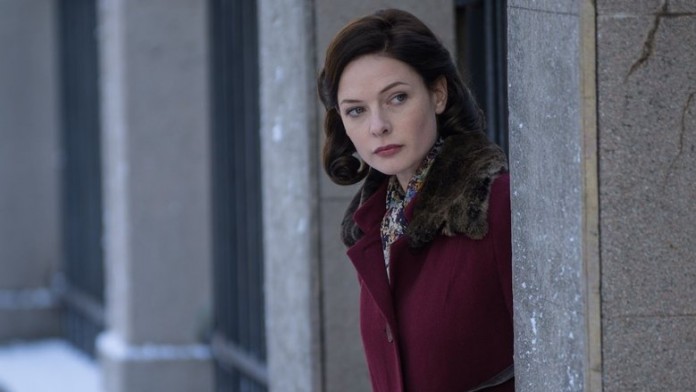There is no denying the wealth of intrigue attached to Shamim Sarif’s 2004 novel Despite the Falling Snow, as a beautifully intricate tale, seamlessly weaving between 1950s Moscow, and 90s New York. However, and while left in the reliable hands of Sarif, tasked with bringing her own tale to life, perhaps a more detached, independent eye would’ve been preferable, for this hackneyed endeavour struggles to free itself from the shackles of the genre tropes and expectations, never quite doing justice to the originality of the narrative at hand.
Beginning in Moscow, we meet Katya (Rebecca Ferguson), a communist spy working on behalf of the Americans during the Cold War. She is assigned a mission by close friend Misha (Oliver Jackson-Cohen) to lead on government worker Alexander (Sam Reid) and steal his documents and secrets to help their cause. What she hadn’t accounted for, however, was the potential in genuinely falling in love with the endearingly earnest young man. Fast forward 40 years and we meet Alexander (now portrayed by Charles Dance) living in New York, still bereaved by his experiences, wanting nothing more than to know what became of his one true love. So his niece Lauren (also played by Ferguson) decides it’s time to find out, and so books a flight to Moscow to investigate this elusive set of affairs that has plagued her dear uncle’s life.
The picture (also written by Sarif) is undoubtedly structured in an intelligent fashion, as the patient viewer is fed vital bits of information along the way. It helps also that we initially see Katya through Alexander’s eyes, as she becomes desirable and empathetic before we learn of her true intentions. However it becomes a challenge to invest in the relationship, as we aren’t subject to the falling in love stage, as one moment she’s using the susceptible man for personal gain, and the next she’s willing to put everything at risk for him – and it’s a transformation we simply do not witness.
The segments taking place in the 90s are somewhat redundant too, and while they may enrich the reader’s experiences during the novel, they are superfluous where the film is concerned. They work only as a tedious deviation away from the captivating elements of the historical sections, and while the stories parallel, it happens in an all too contrived way. It also becomes a challenge for the viewer to suspend their disbelief when Ferguson portrays two roles, in spite of the talents the Swedish actress possesses.
Ferguson does, however, remain the very best thing about this endeavour, equally as believable when taking somebody else for a ride (in 50s Moscow) as she is being taken for a ride herself (90s New York). She’s a distinctly affable performer, and that subtle sense of endearment is essential in forming a bond with Katya, who, effectively, is betraying the protagonist’s trust, and yet we crucially remain on her side. Reid impresses too, but is left with a character that, while sincere, is without any intensity, a bland creation of sorts, and all too easy to walk over, lacking that bit of bite the character requires.
There is no denying that Sarif is vying for innovation with this endeavour, with an inclination to be unique in parts, with certain resourceful shots emblematic of this fact – but the title is let down by its production values. It’s all so brightly lit, and presented in an amateur way – with stilted dialogue, and such clumsy staging. The poor supporting cast do not help matters, turning would could be a great film, into a pastiche of an 80s soap opera – and let’s face it, nobody wants that.









